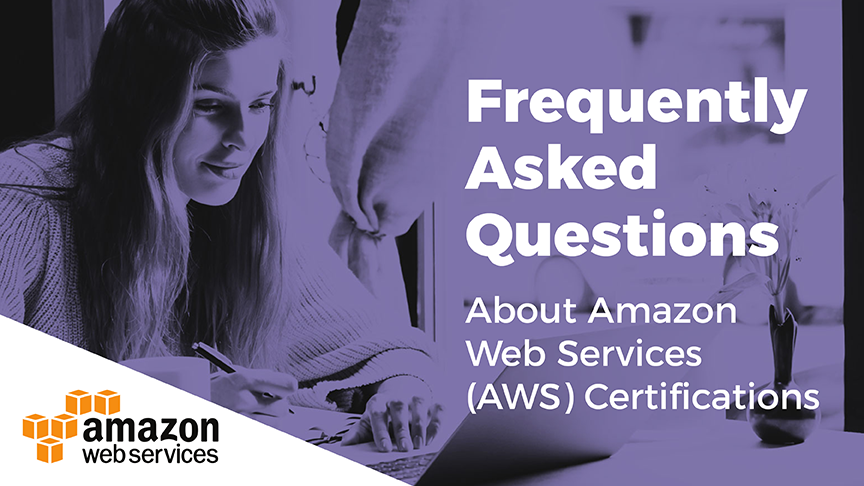Amazon Web Services is the defacto market leader in cloud-computing in the private sector. A recent Gartner report listed AWS market share as 47.8%. To put that in perspective, the next in line is Microsoft (Azure) with a modest 15.5% share. As the cloud infrastructure demands continue to climb, so does the need for certified cloud professionals. Let’s look at the most valuable information for those who are interested in an Amazon Web Services (AWS) certification.
What are the AWS Certifications?
There isn’t just one AWS Certification to prepare for and earn, but rather eleven certifications in total. Overall, these certifications are designed to “validate” cloud experience specific to Amazon Web Services solutions.
What are the different AWS Certifications?
In groupings, there are three “Core” levels of certification listed as foundational level, associate level, professional level, along with a separate category of several role-based “Specialty” area certifications. These role-based areas create the ability to customize a career path and align certifications with actual job duties.
Here are some additional details on the levels and the specific certifications within each.
Foundational Level Certifications
- AWS Certified Cloud Practitioner: This certification conveys foundational knowledge of AWS cloud technology by introducing the basic global infrastructure and architectural principles. Individuals also learn the AWS cloud platform and their overall real use cases. Finally, the certification provides an overall understanding of basic security, billing and deployment methodologies.
Associate Level Certifications
- AWS Certified Solutions Architect: This certification tells the world the certification holder has the ability to architect and deploy advanced applications using AWS technologies while having a good fundamental understanding of all the AWS services and the AWS global infrastructure
- AWS Certified SysOps Administrator: This certification indicates that the holder possesses the skills to operate, manage and implement High Availability (HA) solutions within the AWS infrastructure. In addition, this demonstrates a solid understanding of managing the flow of data to and from AWS platforms.
- AWS Developer: Attaining this certification conveys the ability to deploy, develop, and even debug cloud based applications using AWS services. It shows in-depth knowledge of the basic AWS architecture and best practices.
Professional Level Certifications
- AWS Certified Solutions Architect: Building beyond the associate level Solutions Architect certification, this certification emphasizes the ability to dynamically deploy and design advanced fault tolerant applications that are considered reliable on AWS platforms. Moreover, a professional has the ability to understand cost control as new designs are implemented across the organization.
- AWS Certified DevOps Engineer: As the name implies, this is for an engineering role within a company. Certification holders are responsible for managing the operation and provisioning of AWS EC2 environments. Individuals are also responsible for security controls compliance and advanced governance implementations.
Speciality Certifications
AWS Specialty certifications provide an opportunity to emphasize certain information technology disciplines. There are currently five certifications available within this category:
- AWS Certified Advanced Networking: Focuses on implementing and managing network architectures while following AWS best practices.
- AWS Certified Alexa Skill Builder: Emphasizes the design and architectures of AWS and Alexa’s infrastructure while using AWS best practices.
- AWS Certified Big Data: Utilize Big Data services to maintain large amounts of data while leveraging the AWS infrastructure.
- AWS Certified Machine Learning: Focuses on machine learning solutions using AWS services.
- AWS Certified Security: Designed for individuals with a security role within their company and have a unique understanding of data classifications, encryption options, protocols and a working knowledge of AWS security services.
Why should I earn the AWS Certification?
Earning a AWS certification demonstrates that an IT professional is invested in the future of cloud technology and embraces the capabilities of the market leader. Earning could not only increase the probability of landing that next job interview, but also create opportunities for a long-term, successful career path. At the time of this publication, Indeed.com lists 51,534 open positions requesting experience with AWS across the United States.
The financial benefits are also extremely persuasive. The estimated pay ranges for AWS professionals is between $130K to $150K per year.
In addition to the benefits of landing a high-paying position, increasing skills, and creating advancement opportunities, being a member of the AWS Partner Network enables you take advantage of significant immediate benefits including:
- Event recognitions for exclusive access to lounges at AWS reinvent and summit events
- Acquire access to an AWS certified global community
- Display your recognition of your certification by using your digital badges
- Access to exclusive merchandise at the AWS Certified Store and much more
- Free practice exams to study up on your next certification
- Exam discounts up to 50% off on Microsoft exam vouchers
How can I earn an AWS Certification?
Earning an AWS certification provides a career boost and entitles professionals to numerous benefits, but it’s not easy. Individuals will need to prepare either with a training provider or through diligent self-study. We offer multiple opportunities to prepare with comprehensive practice tests.
For those ready and prepared to sit for the exam will need to create an account at Pearson VUE, choose your specific exam and schedule the exam time at a local testing facility. If you’ve determined that an AWS certification is a great fit for you and your career, best of luck and please let us know how we can help!

